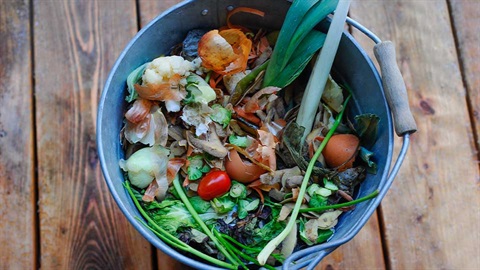Food and green waste bins

Your food and green waste bin is for food scraps and also for garden waste, such as grass clippings, small sticks, weeds, leaves and flowers.
Why collect food waste?
When food and green waste ends ups in landfill, it generates methane and has a big environmental impact and financial cost.
If everyone in Darebin recycled their food scraps, we could save 9,000 tonnes from landfill and 17,800 tonnes of greenhouse gas emissions from entering the atmosphere every year. That is the same as taking 6,130 cars off the road. One of the easiest ways to reduce your impact on the environment is to recycle your food scraps.
If you do not currently have a food and green waste bin, you should have received one mid—2022, as the service was expanded to all residents.
The food and green waste bin in Darebin is 120 litres in capacity.
What can go in your green waste bin?
Put these in your food and green waste bin
- fruit and vegetable scraps
- citrus, onion and garlic
- coffee grounds and loose tea leaves
- egg shells
- used paper towel and newspaper (for wrapping loose food)
- bread, pasta and cereal
- cheese
- meat and bones
- seafood
- general leftovers
Do not put these in your food and green waste bin
- no liquids (e.g. cooking oil. milk)
- no plastic bags, even if labelled compostable or biodegradable
- no plastic wrapping (e.g. cling wrap)
- no household garbage
- no nappies, even if labelled compostable or biodegradable
- no soil, pebbles and rocks
- no treated or painted timber
- no pet droppings
- no cat litter, even if labelled compostable or biodegradable
- no teabags and coffee pods
- no syringes
- no textiles
- no oily pizza boxes
How to use your food and green waste bin
Follow these steps when using your green bin:
- Collect your food waste using any airtight container, such as a kitchen caddy or ice-cream container. Keep it somewhere easy to reach, like your kitchen bench or under the sink, so it's close when cooking or clearing up meals.
- Food waste needs to go in loose without any bags or liners. It can be wrapped in a few sheets of paper towel or some newspaper.
- Put your garden waste in the green wheelie bin. This includes grass clippings, small sticks, weeds, leaves, and flowers.
- Take the wheelie bin out. We collect your food and waste bin every two weeks, alternating with your recycling collections.
- Keep your bin nice and clean. Add layers of dry garden waste between layers of food; keep meat and seafood in the freezer until the day before collection; don’t overfill your bin; keep the lid closed and store your bin in a shady spot.
Using a kitchen caddy
Kitchen caddies make it easy to collect food scraps in the kitchen. When it’s full, just empty it into your green lidded bin.
Biodegradable caddy liners cannot be put in your food and green waste bin.
You don’t need to line your kitchen caddy, but here are a few tips to keep it clean and odour-free:
- Sprinkle bicarbonate of soda in your caddy to minimise smell.
- Wrap food with a sheet of paper towel, newspaper or a plain paper bag to absorb moisture.
- Wash your kitchen caddy regularly.
If you do not have a kitchen caddy and you receive Darebin Council waste and recycling services, and want one, please drop into our Preston Customer Service centre during business hours to pick one up.
Food waste and recycling fact sheets
For more information on what you can and can't put in your food and green waste bin, see our food and green waste recycling brochure(PDF, 539KB) and A to Z recycling guide(PDF, 7MB).
We also have some simple food and green waste fact sheets in:
- English(PDF, 367KB)
- Arabic(PDF, 341KB)
- Chinese(PDF, 208KB)
- Greek(PDF, 282KB)
- Hindi(PDF, 304KB)
- Italian(PDF, 168KB)
- Macedonian(PDF, 174KB)
- Nepali(PDF, 406KB)
- Punjabi(PDF, 233KB)
- Somali(PDF, 170KB)
- Spanish(PDF, 170KB)
- Urdu(PDF, 341KB)
- Vietnamese(PDF, 175KB)
Green waste for businesses
You can consider seeking a private food recycling service. For more information on a number of free and paid food recycling options, refer to our organic waste recycling services guide(PDF, 560KB).
For kids
Back to Earth's kitchen colouring-in sheet(PDF, 270KB) is a great way to teach your kids about what can go in food and green waste bins.